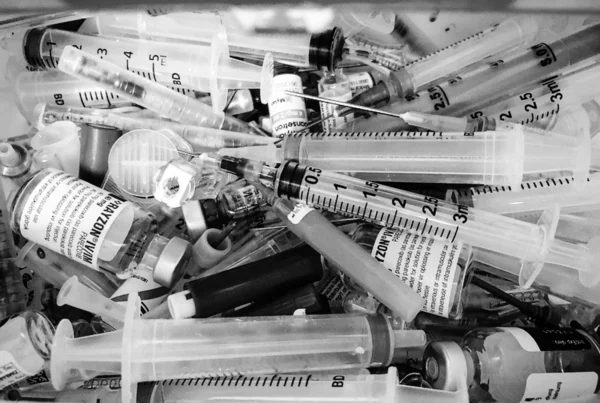
Table of Contents
Fentanyl is becoming one of the most serious drugs on the streets, and it’s causing a lot of problems for healthcare providers, people who use drugs, and law enforcement.
Unfortunately, with all that notoriety there are also a lot of misconceptions about fentanyl, how it works, and what fentanyl actually does.
Those misconceptions are incredibly dangerous because of the incredible potency of this drug. It does not take a large mistake with fentanyl to cause serious issues. It’s critical for more people to understand how long fentanyl stays in your system, how the drug works, and the signs and symptoms of a problem.
The better educated we are about the potential risks of fentanyl, even when used properly, the safer everyone will be in the long run.
What Is Fentanyl?
The first thing we need to clear up is what fentanyl is. It’s not a magical new drug, but we do understand how it works, and the way it works makes sense in the context of the type of medication it is.
So, to start with, fentanyl is a highly potent opioid medication, like Percocet or Vicodin.
To put the strength of fentanyl into perspective, it’s generally considered to be somewhere between 50-100 times stronger than morphine, and we don’t know more precisely because at that level of potency it’s hard to be exact.
Very few doses of fentanyl can have a huge effect on the body. If it’s metabolized too quickly, combined with other drugs, or you take more fentanyl too quickly after the first dose, it’s very easy to overdose on this medication.
Typically, fentanyl is meant to be used for breakthrough pain after surgeries, and in some cases for cancer patients for whom other pain relief options have been ineffective. This medication should never be used for mild to moderate pain, or recreationally. There’s too much risk of an accidental overdose, and there are other medications that are both more effective with fewer risks than fentanyl.
The potency of fentanyl is one of the main reasons it’s important to know how long fentanyl stays in your system because you absolutely do not want to take more than what is safe for your body.
How Long Does Fentanyl Stay In Your System?
There are a few things we need to cover before talking about how long fentanyl stays in your system. For one thing, there is a difference between how long a medication is active in your body, and how long it’s present.
In the case of fentanyl, the drug is active for a much shorter time than it’s typically detectible, which can be important for dosing the medication appropriately and safely.
How long a drug is present is also different from how long that drug is detectible, either because of miniscule amounts of the drug remaining, or because we know and can test for the derivative compounds that your body produces as it breaks down the primary drug.
So, with that out of the way, a dose of fentanyl can last between several minutes and several hours depending on the dose, how much pain the patient is in, and how the drug is administered.
However, small amounts of fentanyl may still be present, and should be accounted for in dosing, for several days after the last dose of the medication.
Lastly, fentanyl is detectible with typical drug tests for between 24-72 hours after taking the medication. It can be detected in hair follicle tests for up to 3 months after using the drug.
What Makes Fentanyl So Dangerous?
All opioid medications come with some degree of risk, and you can overdose on almost all opioids. So, what makes fentanyl so different from other opioid medications?
Well, for one thing, fentanyl is more dangerous, but one of the reasons it’s perceived as so much more dangerous is because this medication is new and isn’t as well understood as most other opioids. There hasn’t been a Dr. House to show people at large what addiction to fentanyl looks like, and it’s not used as often as other opioid medications, which means most people don’t have any direct exposure to someone who needs this medication.
But, it’s important to say that the hype around fentanyl isn’t entirely exaggerated. Instead, it’s more that other opioids are more normalized than they should be and blaming fentanyl for the problems of the opioid crisis can be a way from distracting from the problems caused by other, less potent, opioids.
That said, there is a very real crisis around fentanyl use, and plenty of people are getting fentanyl who shouldn’t or are being dosed with this medication without knowing that they’re taking it.
In fact, fentanyl being used to boost the potency of other drugs, so that dealers can save money and use cheap fillers instead of paying for more expensive drugs to be stolen or created, is one of the big problems with this medication. Fentanyl is cheap, relatively easy for drug dealers and cartels to source, and can be mixed with almost any other opioid to increase the potency of the medication without necessarily feeling different to the user.
The problem is that when someone is given fentanyl and doesn’t know it, they aren’t very likely to dose the drug appropriately.
Additionally, because of how much stronger fentanyl is compared with other opioids, it’s also more likely to cause addiction in users.
Once addicted, it can also be difficult for users to manage the drug and their addiction, especially, again, if they don’t know that the drugs they are getting have been adulterated with fentanyl to make them stronger.
Very small overdoses that might not be noticeable with other medications can be deadly for people using fentanyl.
How Is Fentanyl Ingested?
There are many different ways to ingest fentanyl, just like many medications. In hospitals, fentanyl is often delivered through an IV line. Long term patients may use patches, pills, lozenges, or other methods to take the medication depending on their dose, how often they need the medication, and how they can best tolerate the drug.
Signs And Symptoms Of Fentanyl Use
Like most potent drugs, there are many potential signs and symptoms of fentanyl use, and the exact signs and symptoms vary depending on why and how you take the drug. So, this overview won’t include all the possible signs and symptoms, but you can always talk to your doctor if you’re concerned about any side effects while taking this medication.
- Slow breathing
- Euphoric feeling
- Vertigo
- Lack of coordination
- Constipation
- Nausea
- Dizziness
- Fatigue
- Excessive sleepiness
Symptoms Of Fentanyl Overdose
When it comes to an accidental overdose of fentanyl, you need to act fast. Narcan is the best option, and it may take several doses of Narcan to rescue someone in the middle of a fentanyl overdose successfully.
Overdoses are much less common among people using fentanyl as prescribed but can be very common in people who are using the medication recreationally.
Common signs of a fentanyl overdose include:
- Clammy skin
- Tiny pupils
- Low blood pressure
- Slow heart rate
- Lack of muscle control
- Falling asleep and being difficult or impossible to wake
- Atypical snoring (including snoring that sounds different than normal)
- Slow breathing
Fentanyl overdoses can easily turn fatal if they are not treated immediately. It’s important to make sure you get medical care as soon as possible if you suspect that someone has overdosed on fentanyl. If you or a loved one are taking fentanyl, it’s also important to have at least one dose of Narcan available for them. Ideally you should have more than one dose.
Signs Of Opioid Addiction
There are many potential signs of addiction, and, in some cases, addiction and normal tolerance to a medication that’s being used properly can look very similar. It’s important to ensure you’re working closely with your doctor and monitoring for signs of addiction, looking for potential alternatives, and keeping an eye on how you use fentanyl to keep you safe over time.
Here are some common signs of opioid addiction:
- Feeling like you aren’t yourself when you take your medication
- Taking more of your medication than prescribed, or taking your medication more often than prescribed
- Worrying that you might lose your prescription
- Worrying that your medication doesn’t seem to work the way it used to
- Buying or considering buying fentanyl on the street or from an online pharmacy
- Feeling like you’re missing out on life because of your medication
- Feeling like you’re out of control when you are between doses of your medication
When it comes to fentanyl, it’s important to keep a close eye on your medication and remember that some amount of chemical dependence is normal when you’re taking opioid medications. However, addiction should be dealt with as much as, and as soon as, possible.
Ways To Get Help
Fentanyl addiction can be both serious and dangerous, and it can take a lot of help to manage people who are withdrawing from fentanyl, especially people who started taking fentanyl as a pain treatment since other medications and treatments are likely to be necessary.
If you’re dealing with a fentanyl addiction and are ready to seek help, it might be time to contact Ocean Recovery. A treatment center will be one of the safest and most controlled settings to stop taking fentanyl. Having access to medical care providers is often critical for chronic pain patients who are also trying to overcome addiction.
If you’re ready to kick fentanyl to the curb, contact us. We’re here to help.
Sources:
- Abdullah N. Fentanyl – Oral: Uses, Side Effects, Dosages. NCBI Bookshelf. Updated: May 8, 2022. Accessed May 18, 2023. https://www.ncbi.nlm.nih.gov/books/NBK554511/
- Fentanyl. Accessed February 20, 2023. https://www.dea.gov/factsheets/fentanyl
- Whitlock J. What to Know About Taking Fentanyl Before and After Surgery. Verywell Health. Published June 23, 2022. Accessed February 20, 2023. https://www.verywellhealth.com/fentanyl-and-surgery-dosage-risks-and-side-effects-3156909
- Hartney E. The Fentanyl Crisis—The Drug’s Analogs and Derivatives. Verywell Mind. Published April 24, 2021. Accessed February 20, 2023. https://www.verywellmind.com/treatment-for-opioid-addiction-4160367
- Fentanyl: MedlinePlus Drug Information. Published January 15, 2021. Accessed February 20, 2023. https://medlineplus.gov/druginfo/meds/a605043.html
OCEAN RECOVERY EDITORIAL GUIDELINES
The internet contains a vast amount of misinformation, but when it comes to your health only peer reviewed, research centered data matters. At Ocean Recovery, all content published throughout our website has been rigorously medically reviewed by a doctorate level clinician, and cross checked for medical accuracy. Our editorial process helps our readers trust that the information they are consuming is factual and based upon scientific data. Your health is our top priority, find out more about how we safeguard the integrity of information on our website. Read More About Our Process






